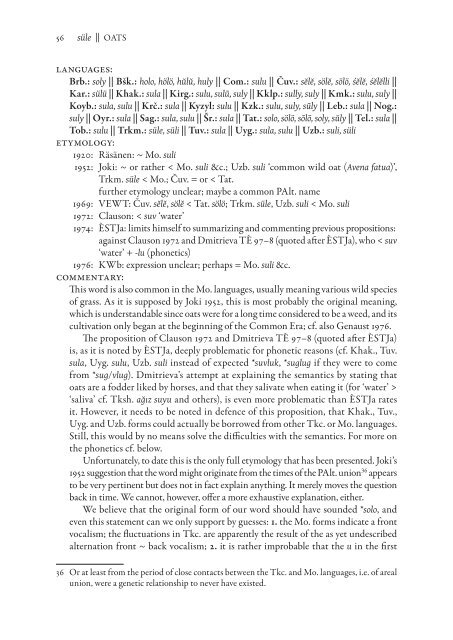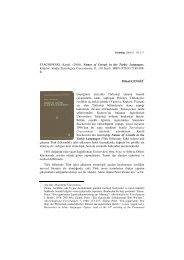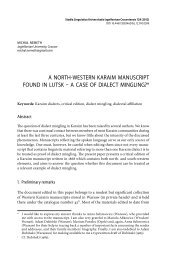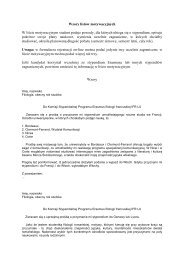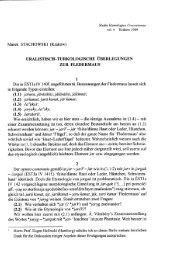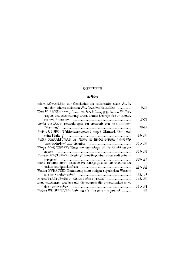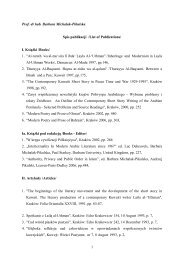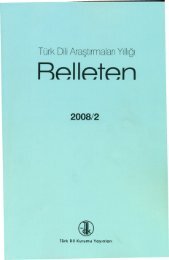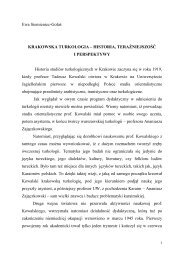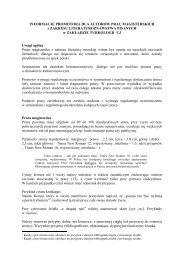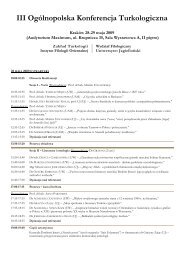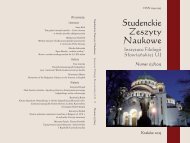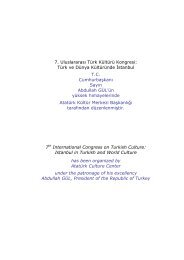Names of Cereals in the Turkic Languages - Wydział Filologiczny UJ
Names of Cereals in the Turkic Languages - Wydział Filologiczny UJ
Names of Cereals in the Turkic Languages - Wydział Filologiczny UJ
- No tags were found...
You also want an ePaper? Increase the reach of your titles
YUMPU automatically turns print PDFs into web optimized ePapers that Google loves.
56 süle || Oatslanguages:Brb.: soly || Bšk.: holo, hölö, hŭlŭ, huly || Com.: sulu || Čuv.: sĕlĕ, sölĕ, sölö, śĕlĕ, śĕlĕlli ||Kar.: sülü || Khak.: sula || Kirg.: sulu, sulū, suly || Kklp.: sully, suly || Kmk.: sulu, suly ||Koyb.: sula, sulu || Krč.: sula || Kyzyl: sulu || Kzk.: sulu, suly, sūly || Leb.: sula || Nog.:suly || Oyr.: sula || Sag.: sula, sulu || Šr.: sula || Tat.: solo, sölö, sōlō, soly, sŭly || Tel.: sula ||Tob.: sulu || Trkm.: süle, süli || Tuv.: sula || Uyg.: sula, sulu || Uzb.: suli, sülietymology:1920: Räsänen: ~ Mo. suli1952: Joki: ~ or ra<strong>the</strong>r < Mo. suli &c.; Uzb. suli ‘common wild oat (Avena fatua)’,Trkm. süle < Mo.; Čuv. = or < Tat.fur<strong>the</strong>r etymology unclear; maybe a common PAlt. name1969: VEWT: Čuv. sĕlĕ, sölĕ < Tat. sölö; Trkm. süle, Uzb. suli < Mo. suli1972: Clauson: < suv ‘water’1974: ÈSTJa: limits himself to summariz<strong>in</strong>g and comment<strong>in</strong>g previous propositions:aga<strong>in</strong>st Clauson 1972 and Dmitrieva TÈ 97–8 (quoted after ÈSTJa), who < suv‘water’ + -lu (phonetics)1976: KWb: expression unclear; perhaps = Mo. suli &c.commentary:This word is also common <strong>in</strong> <strong>the</strong> Mo. languages, usually mean<strong>in</strong>g various wild species<strong>of</strong> grass. As it is supposed by Joki 1952, this is most probably <strong>the</strong> orig<strong>in</strong>al mean<strong>in</strong>g,which is understandable s<strong>in</strong>ce oats were for a long time considered to be a weed, and itscultivation only began at <strong>the</strong> beg<strong>in</strong>n<strong>in</strong>g <strong>of</strong> <strong>the</strong> Common Era; cf. also Genaust 1976.The proposition <strong>of</strong> Clauson 1972 and Dmitrieva TÈ 97–8 (quoted after ÈSTJa)is, as it is noted by ÈSTJa, deeply problematic for phonetic reasons (cf. Khak., Tuv.sula, Uyg. sulu, Uzb. suli <strong>in</strong>stead <strong>of</strong> expected *suvluk, *suglug if <strong>the</strong>y were to comefrom *sug/vlug). Dmitrieva’s attempt at expla<strong>in</strong><strong>in</strong>g <strong>the</strong> semantics by stat<strong>in</strong>g thatoats are a fodder liked by horses, and that <strong>the</strong>y salivate when eat<strong>in</strong>g it (for ‘water’ >‘saliva’ cf. Tksh. ağız suyu and o<strong>the</strong>rs), is even more problematic than ÈSTJa ratesit. However, it needs to be noted <strong>in</strong> defence <strong>of</strong> this proposition, that Khak., Tuv.,Uyg. and Uzb. forms could actually be borrowed from o<strong>the</strong>r Tkc. or Mo. languages.Still, this would by no means solve <strong>the</strong> difficulties with <strong>the</strong> semantics. For more on<strong>the</strong> phonetics cf. below.Unfortunately, to date this is <strong>the</strong> only full etymology that has been presented. Joki’s1952 suggestion that <strong>the</strong> word might orig<strong>in</strong>ate from <strong>the</strong> times <strong>of</strong> <strong>the</strong> PAlt. union 36 appearsto be very pert<strong>in</strong>ent but does not <strong>in</strong> fact expla<strong>in</strong> anyth<strong>in</strong>g. It merely moves <strong>the</strong> questionback <strong>in</strong> time. We cannot, however, <strong>of</strong>fer a more exhaustive explanation, ei<strong>the</strong>r.We believe that <strong>the</strong> orig<strong>in</strong>al form <strong>of</strong> our word should have sounded *solo, andeven this statement can we only support by guesses: 1. <strong>the</strong> Mo. forms <strong>in</strong>dicate a frontvocalism; <strong>the</strong> fluctuations <strong>in</strong> Tkc. are apparently <strong>the</strong> result <strong>of</strong> <strong>the</strong> as yet undescribedalternation front ~ back vocalism; 2. it is ra<strong>the</strong>r improbable that <strong>the</strong> u <strong>in</strong> <strong>the</strong> first36 Or at least from <strong>the</strong> period <strong>of</strong> close contacts between <strong>the</strong> Tkc. and Mo. languages, i.e. <strong>of</strong> arealunion, were a genetic relationship to never have existed.


